Emmanuel Carreira SJ, PhD
Renaissance Man of
Philosophy and Light "Every human being is naturally a philosopher. We are not satisfied with knowing the chemical makeup of a human being, we want to know the person," says Father Emmanuel Carreira, Jesuit Priest and scientist. 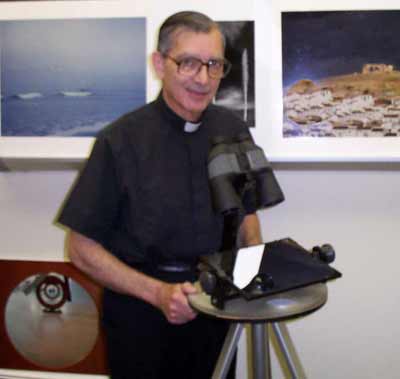
Fr. Carreira with one of his inventions
He has taught one semester a year of Physics, Astronomy, Photography and Science at John Carroll University for almost thirty years. Over the same time he has been teaching the other semester at a university in Spain. His topic in Spain is "Metaphysics of Matter". As a young boy in rural Spain, Fr. Carreira probably never knew his inquisitive mind would take him as far as it did. He says he is blessed by Providence to have come from a family in which knowledge, art, beauty and science were all appreciated. His parents were hard working people who instilled similar attributes in their children. Fr. Carreira had seven siblings, two of his brothers died very young; two brothers and three sisters are still living. His mother played a very strong role in his life. He grew up during the Civil War in Spain and his father was away in the army when he was 5 to 10. His mother shared many of the interests Fr. Carreira now pursues. She was a teacher and a collector of ores and minerals. As a young boy, he would study the minerals and do chemical testing on them to see what they were made of. He recalls that the times were much less regulated then and a young boy purchasing acid and ingredients to make rockets and gunpowder was not a cause for alarm. So he conducted experiments as often as he could, on most anything he could. He has been interested in Astronomy as far back as he can remember. His goal was to someday see the craters of the moon. Not to be stopped by lack of funds or supplies, he made his first telescope with a cardboard tube salvaged from the dry cleaners. He added a lens donated by a far-sighted neighbor and a few more parts he found here and there. And for the first time in his young life he was able to see the craters, and they were every bit as exciting as he expected them to be. He was ecstatic! "I couldn't have been happier if I had won the lottery." He read somewhere that you could safely view sunspots by using projection, rather than looking straight into them. So he set up his telescope to reflect onto a soup spoon and then onto a large clear surface and he could, indeed, see the sunspots along with the Rings of Saturn, the four main moons of Jupiter and many other remarkable sights. His mother had an old camera, with two speeds, that you looked down into and saw the reflection of the picture you wanted to take. He bought a roll of black and white film and noted that the film was wrapped in red paper, as the film was not sensitive to red. So he painted a light bulb red, got his mom's soup bowls, some chemicals from a friend in town, and created his own dark room and began developing his own pictures. He started making prints and even built and enlarger. 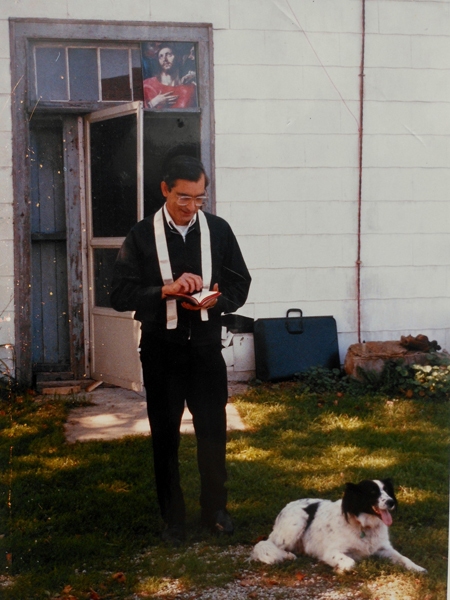
What started out to be a minor knee injury in 1939 turned, with the help of an "inopportunistic infection", into a problem that would stay with him for the rest of his life. At age 10, a school floor collapsed and the multiple fractures added to his already problematic leg. He had dreamed of one day working in the jungles with the missionaries, but the limits imposed on him by his injury would never allow this. When he finished High School, Emmanuel asked to be accepted into the Jesuit Community. He had attended a Jesuit boarding school his last three years of High School and wanted to be a permanent part of that community. He was accepted and turned his attention toward teaching. Very few people had cars in the 1950's in Spain. Madrid had good schools but he couldn't ride the train to get to them. A fortunate encounter with a Jesuit from the United States provided him with information about a Jesuit community in the US, which would allow him to live on a campus and avoid the daily travel. So, in 1957, with the permission of the Jesuit order, he was sent on what turned put to be an epic voyage from Spain to the United States. He would first study Theology, since that was taught in Latin, and he could learn English at the same time to eventually enable him to earn a degree in Physics. The journey to the US was expected to take a week but the ship was struck at midnight one night by another ship near the Straits of Gibraltar. They were fortunate that the other boat missed their fuel tanks by a mere 3 feet. When they woke up in North Africa and saw the other boat looking like an accordion they learned that they were even more fortunate - the other boat had been carrying a load of 56 tons of dynamite! "Thank God it didn't put us into orbit." After finally landing in New York and traveling to Kansas, he was limited by the many hills on the campus at St. Mary's, which got very icy in the winter. Fr. Carreira transferred to a community in West Bading Springs, Indiana, where everything was enclosed in a single building. It had been a popular casino in the 1920's but with the Depression the 600-room facility could no longer support itself so the owner sold the building to the Jesuits for $1.00. It was here, in the lobby of a former gambling casino, that Fr. Carreira was ordained in 1960. 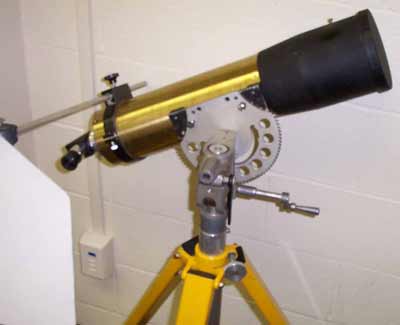
Father Carreira's brass telescope
Always a tinkerer, ("I like machines") Fr. Carreira started exploring and found an old brass telescope in the attic. It had been made in France around the turn of the 19th century. The lens was cracked and it was not functional, but it was certainly a start. He began searching out things that could be usable parts. Someone told him there was a 12-inch mirror at John Carroll University in Cleveland that was once used at St. Ignatius High School that he could have. He found a bottle washing machine from an old Coca Cola plant and found brass articles, like old spittoons, throughout the one-time Casino which he traded for parts at the junkyard. There were some parts he knew he would have to make himself, because he could not find everything he needed. He had never used the tools in a machine shop before, but that was not going to stop him. He taught himself to use an old lathe which was using the transmission from an old truck. He took the bottle washing machine, and all of the many pieces and parts he found and created his own furnace in which to cast aluminum! A steel spittoon they found became the crucible of the furnace. He made patterns of wood and cast aluminum parts up to 20 lbs. He took the mirror, the old brass tubing and all of the parts and together with his new interest in machine shop and his cast aluminum, created a new telescope, a mount and a domed-observatory twelve feet in diameter! This young man, who knew nothing about machine shop, went on to take charge of the Machine Shop at John Carroll for over 15 years. In recent years Fr. Carreira has created and patented two amazing innovations for use in Astronomy - the Sky Window and the Drum Telescope. Each was designed to make using a telescope more efficient and more comfortable. 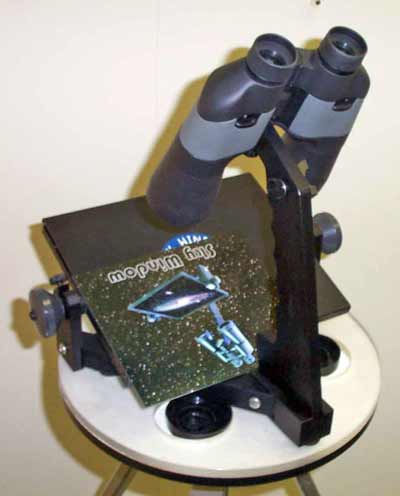
Sky Window Telescope
When he designed the Sky Window he thought about how an astronomer works most comfortably. He decided that it was when he could use both eyes and sit down at a table - like using a microscope. He says it was "the most obvious thing to do - but apparently obvious isn't always what one thinks about." This patented device was featured on the cover of Sky and Telescope Magazine and listed as one of the ten most significant products for the Year 2001 for amateur astronomers. 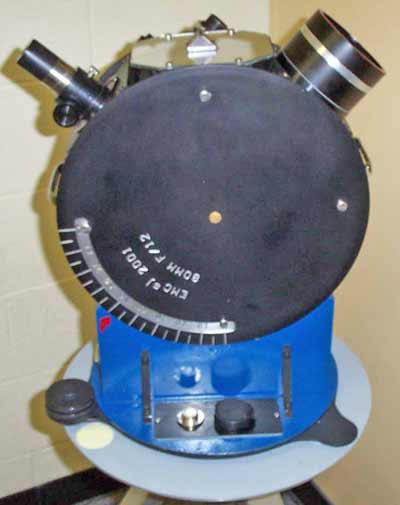
The Drum Scope
His other recent invention that has received much well deserved attention in the world of Astronomy is the Drum Scope. When you think of a telescope, you usually think of a long tube with lenses in both ends. Fr. Carreira's inventive mind came up with a few tricks to make the device stable and portable. The light is captured in a lens and is directed around a round drum till it reaches the eyepiece.
Fr. Carreira has given thousands of lectures in Spain, the U.S., South America, Mexico, Germany, Chile, Ireland, Argentina and many more locations. He held a free annual lecture series at John Carroll covering such topics as "The Mysteries of the Universe" and "From Science to Philosophy". His lectures are extremely popular because he presents difficult subjects clearly and logically. He doesn't want people to say "I didn't understand a thing - he must really be smart." In addition to being a teacher, a lecturer, and a "tinkerer", he is also a painter (though he hasn't painted in awhile examples of his work are extraordinary) and photographer. This Renaissance Man is even "sufficiently crazy or daring to write some poetry." He began by translating verses from Spanish to English in sonnet form and this evolved into his own creations. He used some leftover candles and made a wax mold that he carved with a little screwdriver to create a medal that JCU is still using.
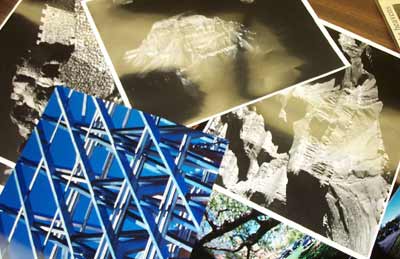
Some of Rev. Carreira's photographs
His photographs are breathtaking - with equal attention given to the subject, the background, the composition, and of course, the light and shadows. Fr. Carreira sees beauty everywhere he looks. He finds the humblest of subjects and uses his photography to show them in all of their glory. He is strongly attracted by light playing with shadows and sees things most of us miss. He will take multiple photographs of the same object and by changing angles, lighting, perspective or even to black and white, he allows layers of subtlety to emerge and create a seemingly new object with new intensity and meaning. 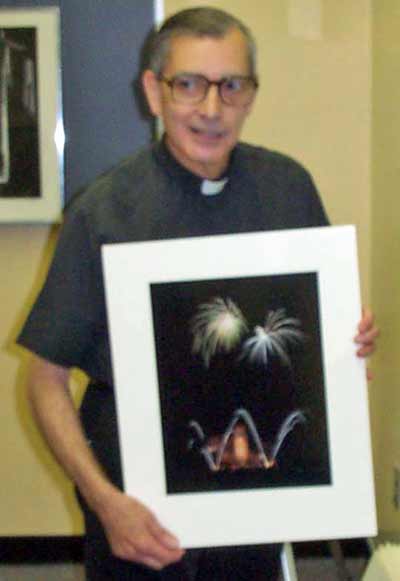
Fr Carreira with one of his photos
Some of his photos have appeared in books (the moon taken from the Vatican Observatory) and others have been used in promotional publications (Halley's Comet over the JCU campus) and even an annual calendar. While some of his photos are related to science (he caught the mini-explosion of a laser being shot into a liquid on film), most are ordinary subjects viewed through an extraordinary eye. He used his photographic technique of slowly squeezing the release to take a picture to astound people once again. He was invited to take part in a target shooting contest at the school to win a turkey. He had never fired a gun before but analyzed the problem and used his technique to win the contest - beating out the guards and military men - even a Colonel. Fr. Carreira is a highly educated and very intelligent man, with multiple degrees in physics and theology.
He sees no conflict in teaching both Theology and Science. They are different methodologies, and both hold certain truths. It is wrong to try and reduce everything to the same method. 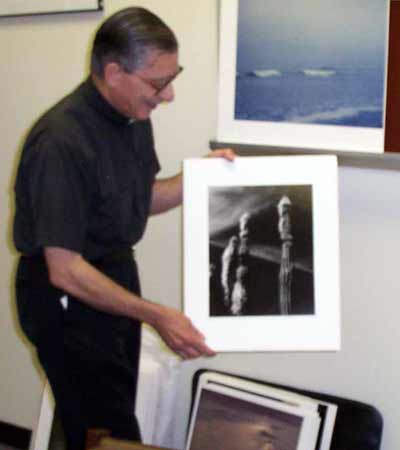
"If you ask a scientist to prove to you that kicking a person is wrong, he will not be able to do so. Science does not account for ethics. If you ask a scientist to tell you the literary value of Hamlet he will be able to tell you the type of ink used, the number of letters or words, the length of the play, even the weight of the paper it is printed on, but he will not be able to measure the literary value.""If you give a Chemist the Mona Lisa," he argues, "the scientific method will just tell the chemicals of the pigments - not the artistic worth or value." He goes on to explain that science deals exclusively with the activity of matter that can be proven experimentally and measured. So Science cannot explain the purpose of life, the meaning of existence or why matter exists. "There are much more important questions than what science can answer." Philosophy has made an attempt but doesn't have the methodology to reveal the specifics and details. Fr. Carreira is not afraid to say he doesn't have an answer or that, in fact, there is no answer. "There are some things that are simply a mystery of faith." By this admission, he is the more believable when he states something as fact. He is fond of quoting a great physicist who said, "I think I can safely say that nobody in the world understand Quantum Mechanics." If we can't understand Quantum Mechanics, how can we understand God? "I would be very let down if I could understand God, when I can't even understand myself." From the viewpoint of Physics, "things wear down." Eventually the universe will be mostly empty space with specks of matter here and there. "That's all science can tell us." He asks, "Who cares who was the most important dinosaur?" Eventually we, and all of our achievements, will be like that. There must be another purpose. "The most basic reason we cannot understand God is that he is infinitely simple and we only understand things we can take apart and prove." Some modern scientists argue that the universe expands and contracts followed by a Big Bang and the process repeats over and over. Fr. Carreira argues, "If it was stupid to do once, how stupid is it to repeat? We need better answers than that and they won't come from equations. It will come from philosophy and then theology." 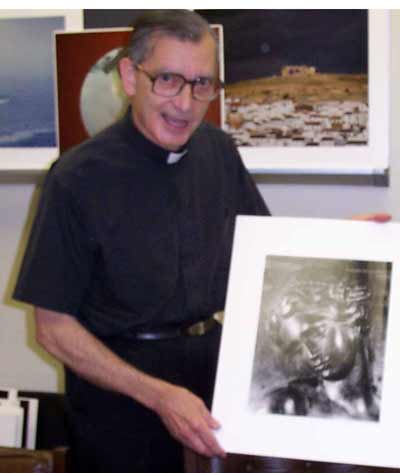
Rev. Emmanuel Carreira with another of his photos
Fr. Carreira has been called a perfectionist, and he accepts that title proudly. "I can not settle for less than I know I can do or less than I know something should be". It is the reason he can take such pride in his achievements; he knows they are always his best. There is no such thing as "good enough" to Fr. Carreira. In the machine shop everything must fit perfectly. He will redo a photo over and over until it is exactly what he wants. He believes that the worst enemy of true human excellence, both personal and societal, is the idea that everything is a matter of opinion and that nothing is an absolute truth. "There most definitely is absolute truth. If you do not believe this, even Science is impossible. Democracy does not determine truth. If the majority of the people decide that the earth is flat, it is none-the-less round" Historically, science did not develop in the great cultures of Asia. Technology, the use of things in practical ways, did but Science, the understanding of why, did not. China had gunpowder but no Chemistry. India knew the motion of planets but no Astronomy. Why? "The objectivity of the world is not considered important." Their culture is more concerned with the individual's viewpoints so they can accept contradictory statements for the sake of unity. "If the idea of contradiction is not allowed, you cannot do science." The most important truth to seek is "self-truth". "What we know," says Fr. Carreira "should ultimately be the reason for what we do. Truth may be difficult to find bit it is worth seeking." Fr. Carreira is a rare breed of person who simultaneously sees minutia and entirety; science and theology; problem and solution. He will be retiring from John Carroll and returning to Spain on June 25, 2002. His brilliant mind and artistic abilities will truly be missed and hopefully he will return frequently.
Profiled by Debbie Hanson and Dan Hanson
Top of Page
Back to Profiles of Cleveland Seniors
| 
